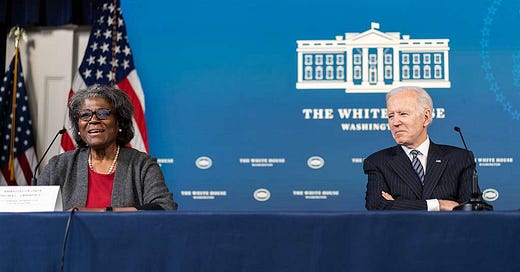
The Charade at the UN Security Council
UNSC resolutions affect millions of lives. They should not be used for political theater.
The U.S. administration under Joe Biden is not known for deep strategic thinking, and certainly not for clever moves. On the international stage, they are known for callousness, cynicism, holding the lives of others cheaply, and reliance on aggression.
They lived up to that latter description at the United Nations Security Council earlier today. But surprisingly, they did so using guile and strategic thinking that is unusual for them.
The resolution the United States brought to the UNSC today was mis-characterized widely by the media as a call for a ceasefire. It was not. It was intentionally worded to give that impression, but all it did was highlight the need for a ceasefire (as if anyone needs the United States, of all countries, to do that) and call for support of the talks going on in Doha that are centered on a temporary pause in Israel’s campaign of genocide in Gaza to free the Israeli hostages and, at least according to the American vision, to facilitate humanitarian assistance to the besieged population of Gaza.
That’s all this resolution did: attempt to win the Council’s support for the American efforts. It is yet another in a long line of deceptive moves by the Biden administration, designed to deflect criticism of its policies and try to mollify protesters calling for a halt to the slaughter and starvation in Gaza while avoiding, at all costs, any cessation in the flow of arms the administration is sending, through a variety of means, to Israel, even while the House of Representatives holds hostage the bonanza of killing toys worth $14.3 billion to Israel.
What makes this resolution so clever is that it never mattered to the United States whether or not it passed. If it did pass, the U.S. could argue that it was doing what it could to facilitate a ceasefire and then pick from its laundry list of phony excuses (Benjamin Netanyahu’s obstinance, Hamas’ rejectionism, the lack of a distribution network, etc.) to explain why people in Gaza were still dying in droves.
But they didn’t really expect it to pass. Both for substantive reasons and due to the often petty politics that clog the UNSC, they expected that Russia would veto the resolution, probably with support from China, which is exactly what happened. Algeria, which doesn’t have veto power, also voted against the resolution. Guyana abstained.
Now the U.S. has the best of all worlds. They can continue supporting Israel in its mass slaughter of Palestinian civilians while sitting on their high horse and condemning Russia for preventing a ceasefire that was never going to come about regardless. They can claim to have tried to bring a ceasefire resolution, and that they were doing what they could to rein in Netanyahu’s excesses and protect Palestinian civilians.
While the charade of protecting Palestinian civilians is unlikely to convince critics of Biden’s policies, it will reinforce those desperate to pretend that Biden is something other than the genocidal criminal he is. Biden will also find more success in painting Russia as preventing a ceasefire, even though Russia has actually promoted substantive resolutions for ceasefires, which this one was not.
It's a win-win for Biden, and Israel gets to continue its campaign in Gaza unencumbered, as it would have even if Russia had not vetoed. That’s what makes the resolution clever. It’s also what makes it cynical and monstrous.
Watching the statements by the American and Russian ambassadors to the UN around the resolution was, as always, incredibly frustrating and illustrative of the dysfunction of the United Nations structure.
Both Linda Thomas-Greenfield and Vasily Nebenzya moralizing at the Council while their respective governments are literally bathing in Palestinian and Ukrainian blood, respectively, was a revolting sight. Each accused the other of hypocrisy, of imperialistic thinking, of disregard for the lives of innocents.
And, of course, each was absolutely correct about the other, while failing utterly to recognize their own nation’s guilt of all the same transgressions.
The spectacle of these two equally contemptible and dishonest people dueling for a moral high ground that neither ambassador nor the respective states they represent have any right to laid bare the deeply flawed structure of the United Nations in general and the Security Council specifically.
The fact that both these countries can veto any resolution is intolerable. The hope for cooperation on which that structure was built almost eight decades ago has long since evaporated. And it is the veto that always draws the most attention.
But the Biden administration—which arguably has set new standards in performative actions meant to replace policy actions, both within the United States and in its international affairs—has also demonstrated the dangers of using the UNSC for propaganda purposes. That is, ultimately, what this resolution was all about.
When we think about what international institutions should look like, measures to bar this sort of manipulation of the international political system for political and rhetorical gains must hold a prominent place in our thinking.
Ultimately, the decisions reached by the Security Council—the only body at the UN with any real teeth—affect the lives of millions of people. It should not be reduced to a political toy, as it has been by the United States (as well as Russia) too many times.
As always, follow me on:
Twitter @MJPlitnick
Facebook https://www.facebook.com/MitchellPlitnick
Bluesky @mjplitnick.bsky.social
Threads @mjplitnick
Mastodon @MitchellPlitnick@journa.host
for my latest hot takes, comments, and news updates.












